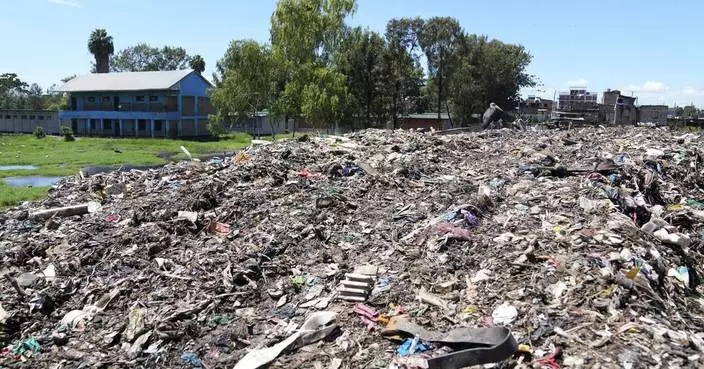The resumption of NASCAR's Cup playoff race in Texas was still on hold Monday because of more rain and a dreary forecast.
There was no official word from NASCAR on when the race might proceed.
Only 52 of the 334 laps were completed Sunday before mist and drizzle forced the race to stop. There was a delay of more than four hours before it was postponed until Monday.
When the race was supposed to resume in the morning, the rain from overnight had continued and temperatures were in the mid-40s.
Cars were still parked in the garage and jet dryer trucks were making slow laps around the 1 1/2-mile track.
Two drivers retiring from full-time NASCAR competition after this season, Clint Bowyer and seven-time Cup champion Jimmie Johnson, were running 1-2 Sunday when the race was halted.
The cars kept running for eight laps after the weather caution first came out Sunday, with jet dryers circling the track at the same time. The cars sat uncovered on pit road for about half an hour before the tarps came out and the drivers and crews headed for cover.
Erik Jones was running third, ahead of Joey Logano, the only driver locked into a spot in the final four after winning a week earlier at Kansas.
Martin Truex Jr. was in fifth place, having already recovered from being forced to start at the back of the field because of an illegal spoiler. He was just ahead of fellow playoff contender Chase Elliott.
Kevin Harvick, who has won the last three fall races in Texas and is a nine-time winner this season, brushed the wall while leading on Lap 29. With damage to his car's right side, he was 36th and one lap down when the race stopped.
——
More AP auto racing: https://apnews.com/apf-AutoRacing and https://twitter.com/AP_Sports
WASHINGTON (AP) — The Biden administration plans to impose major new tariffs on electric vehicles, semiconductors, solar equipment and medical supplies imported from China, according to a U.S. official and another person familiar with the plan.
Tariffs on electric vehicles, in particular, could quadruple — from the existing 25% to 100%. The plan was described by the people on condition of anonymity because they were not authorized to provide details ahead of a formal announcement.
The tariffs, expected to be announced Tuesday, come as officials across the Democratic administration have expressed frustration over China's manufacturing “overcapacity” of EVs and other products that they say pose a threat to U.S. jobs and national security.
Industrialized nations including the United States and its European allies fear a wave of low-priced Chinese exports will overwhelm domestic manufacturing. On the U.S. side, there is particular concern that China’s green energy products will undermine massive climate-friendly investments made through the Democrats’ Inflation Reduction Act that President Joe Biden signed into law in August 2022.
The additional tariffs also carry some political heft going into the November presidential election. Both Biden and his presumptive Republican challenger, former President Donald Trump, have told voters that they'll be tough on China, the world's second largest economy after the United States and an emerging geopolitical rival.
Biden has defined his policy as “competition with China, not conflict.” He has embraced an industrial strategy that has used government financial support to pull in private investment in new factories and advanced technology, while limiting the selling of computer chips and other equipment to China.
Trump has floated the idea of levying massive tariffs against China in order to reduce the U.S. trade deficit with that country. He has repeatedly claimed that Biden's support for EVs would ultimately cause American factory jobs to go to China.
Tuesday's announcement is expected to keep in place some tariffs that were imposed during Trump's administration, covering about $360 billion in Chinese goods. The new tax on imports would add products such as Chinese syringes and solar equipment.
There is the risk that tariffs could lead to a broader trade conflict between the two countries as they respond to each other's moves. China is seeking to create a technological edge and move up the economic chain.
There are some indications that China is cooling its production of lithium-ion batteries used in EVs, cell phones and other consumer electronics at a time when it is facing increasing criticism from the West.
On Wednesday, China’s Ministry of Industry and Information Technology issued a draft rule aimed at “strengthening the management of the lithium-ion battery industry and promoting the sector’s high-quality growth.”
The draft, which was posted on the ministry’s website for public input, says companies should be striving for better technological innovation, higher quality and lower costs, rather than expanding existing capacity.
Lithium battery plants built in restricted farmlands or industrial zones should be shut down, the draft says.
U.S. Trade Representative Katherine Tai is conducting a review of the Trump-era tariffs, and Republican lawmakers including House Ways and Means Committee Chair Jason Smith and Trade Subcommittee Chair Adrian Smith are urging a “swift conclusion” to the probe.
“Continued inaction on the four year review poses serious risks for U.S. farmers, manufacturers, innovators, small businesses and workers," they wrote in a letter to Tai this week.
Meanwhile, Ohio Democratic Senator Sherrod Brown said in a tweet on Friday that “Tariffs are not enough. We need to ban Chinese EVs from the US. Period.”
The Biden administration has also said it will investigate Chinese-made “smart cars” that can gather sensitive information about Americans driving them. The Commerce Department in February issued a notice of a proposed rulemaking that launches an investigation into national security risks posed by “connected vehicles” from China and other countries considered hostile to the United States.
There currently are very few EVs from China in the U.S., but officials worry that low-priced models could soon start flooding the U.S. market, even with a 25% tariff.
A car model launched last year by Chinese automaker BYD sells for around $12,000 in China. The car’s craftsmanship rivals U.S.-made EVs that cost three or four times as much — and is stoking fear in the U.S. industry.
The Alliance for American Manufacturing — an alliance of businesses and the U.S. Steelworkers union — released a report in February that says the introduction of inexpensive Chinese autos to the American market “could end up being an extinction-level event for the U.S. auto sector.” The U.S. auto sector accounts for 3% of America’s GDP, according to the report.
Treasury Secretary Janet Yellen, who traveled to Guangzhou and Beijing in early April, cited the manufacturing of electric vehicles and their batteries as well as solar energy equipment — sectors that the U.S. administration is trying to promote domestically — as areas where Chinese government subsidies have driven rapid expansion of production.
“China is now simply too large for the rest of the world to absorb this enormous capacity. Actions taken by the PRC today can shift world prices,” she said during a speech delivered in Beijing in April, using the acronym for China’s official name, the People’s Republic of China.
“And when the global market is flooded by artificially cheap Chinese products, the viability of American and other foreign firms is put into question.”
The plan for new tariffs was reported earlier by Bloomberg News and The Wall Street Journal.
—
Associated Press reporter Matthew Daly contributed to this report.

FILE - A worker checks solar panels at a factory in Jiujiang in central China's Jiangxi province on March 16, 2018. The Biden administration is planning to announce new tariffs on electric vehicles, semiconductors, solar equipment and medical supplies imported from China. (Chinatopix via AP)

President Joe Biden boards as departs on Marine One at Marina Green parking lot with the Golden Gate Bridge behind, Friday, May 10, 2024, in San Francisco. (AP Photo/Alex Brandon)











